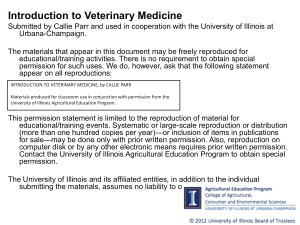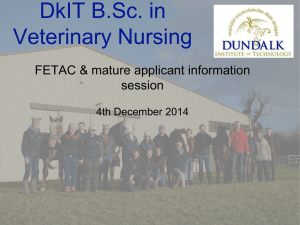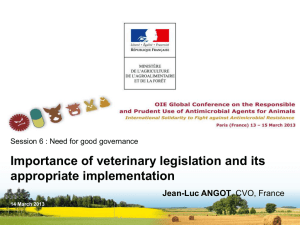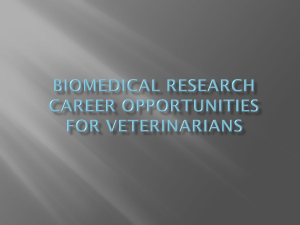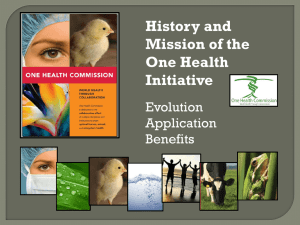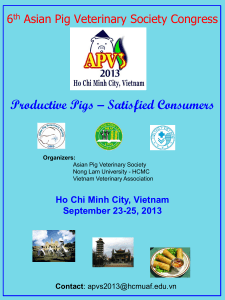Veterinary education
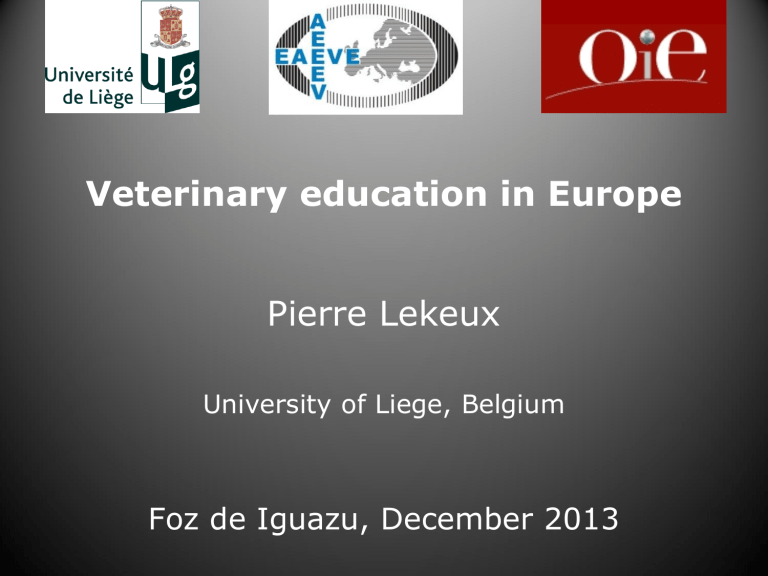
Veterinary education in Europe
Pierre Lekeux
University of Liege, Belgium
Foz de Iguazu, December 2013
Veterinary education: a long story
Current situation
• Around 100 vet schools in 38 countries
• Several national regulations but 1 EU directive (2005/36)
• EAEVE (European Association of Establishments for Veterinary
Education )
• FVE (Federation of Veterinarian of Europe)
• EBVS (European Board for Veterinary Specialization)
• OIE (World Organisition for Animal Health)
Major challenges
• Number of students to be educated
• Amount of information to be taught
• Costs for clinical training
• Harmonization & evaluation
The dream .. and the reality
Information explosion
• new scientific data
• new domestic animal species
• new clinical disciplines
• new regulations
• new IT and diagnostic technologies
• new requirements at the level of specialized knowledge & know-how
Huge costs for clinical training
Veterinary Medicine
Admission (0-2yr)
Basic training (5-6yr)
Clinical training (4yr) MSc-PhD (4yr)
General practitioner Specialist Academic
Veterinary education in EU
• Basic training
• Specialization
• Research training
• Continuing education
Basic training
• Bachelor level (180 credits, pre-clinical)
• Master level (180 credits, clinical)
Specialization
By discipline:
• European College of Veterinary Anaesthesia
• European College of Veterinary Diagnostic Imaging
• European College of Veterinary Internal Medicine
• European College of Veterinary Neurology
• European College of Veterinary Ophthalmologists
• European College of Veterinary Surgeons
• European College of Animal Reproduction
• European College of Veterinary Clinical Pathology
• European College of Veterinary Dermatology
• European College of Veterinary Pathologists
• European College of Veterinary Pharmacology and Toxicology
• European College of Veterinary Dental Medicine
• European College of Laboratory Animal Medicine
• European College of Veterinary Behavioural Medicine
• European College of Veterinary and Comparative Nutrition
• European College of Veterinary Public Health
• European College of Veterinary Parasitology
Specialization
By species:
• European College of Bovine Health Management
• European College of Porcine Health Management
• European College of Avian Medicine and Surgery
• European College of Equine Internal Medicine
Research training
• MSc (60 credits)
• PhD (180 credits)
Continuing education
• Compulsory for :
– Veterinary Public Health matters
– keeping the specialist status
• Highly encouraged for the other topics
Evaluation of the veterinary training
Basic policy of the UE:
• free movement of people, goods and services
(eg regulated professions)
• mutual recognition of academic degrees and titles
Consequently harmonization & evaluation of professional training are required
Historical overview
• Up to 1978: each country and faculty had a curriculum based on local regulation-tradition
• 1978: EU directives 1026 & 1027 required harmonization & defined minimum standards for the 9 member states
• 1988: foundation of EAEVE and description of Standard
Operation Procedures (SOP) reviewed annually
• 2005: new EU Directive 2005/36 describing the minimum curriculum for veterinary training
• 2012: OIE recommendations on the Competencies of graduating veterinarians (‘Day 1 graduates’) to assure
National Veterinary Services of quality
Training standards based on
EU Directive 2005/36
• 5-year curriculum (minimum)
• Definition and listing of basic and clinical subjects, public health, food hygiene, animal welfare
• Concept of hands-on-clinical teaching in common domestic species (pet, horse, cattle, pig, poultry, ..)
• Concept of evidence-based medicine, researchbased teaching, problem-solving learning
• Concept of ‘omnicompetent’ veterinary graduate with ‘day+1 skills’
Basic subjects
• Physics
• Chemistry
• Animal biology
• Plant biology
• Biomathematics
Basic subjects
– foreign languages
– Team working
– Problem-based learning
– Access to data bases
Specific subjects: pre-clinical sciences
• Anatomy
• Histology & embryology
• Physiology
• Biochemistry
• Genetics
• Pharmacology & Pharmacy
• Toxicology
• Microbiology
• Immunology
• Epidemiology
• Professional ethics
22
Specific subjects: clinical sciences
• Obstetrics & reproductive disorders
• Pathology
• Infectiology
• Clinical medicine
• surgery & anesthesiology
• Preventive medicine
• Diagnostic imaging
• Veterinary public health
• Veterinary legislation and forensic medicine
• Therapeutics
• …
Specific subjects: animal production
• Animal production
• Animal nutrition
• Rural economics
• Animal husbandry
• Veterinary hygiene
• Animal ethology, protection & welfare
Specific subjects: food hygiene
• Inspection & control of animal foodstuffs or of animal origin
• Food hygiene and technology
• Practical work in slaughtering and processing of foodstuffs
Evaluation Process
• Faculty applies for the evaluation
• Faculty prepares Self Evaluation Report
• Expert team conducts the on-site visit and delivers report
• EAEVE-FVE : evaluation report and final decision
On-site Visit
• 5 Experts from different countries :
– Basic Sciences
– Clinical Sciences (academic teacher)
– Clinical Sciences (practitioner)
– Animal Production
– Food Hygiene
• + 1 EAEVE Coordinator
• + 1 undergraduate student (observer)
• Standard 4-day visiting timetable
Current Evaluation Status
• ~100 Veterinary Faculties in EU:
– Approved: 57
– Conditionally approved: 4
– Not approved: 20
– Not visited yet: ~20
Evaluation report and final decision available on the Faculty and EAEVE websites
Evaluation status provides information for stakeholders
• Students (future, undergraduate, postgraduate,
Erasmus, interns, residents, ..)
• Universities & faculties
• Employers (private, public, ..)
• EU and local authorities
Future developments
• Joint effort between EAEVE and
– similar organizations from other continents
– OIE (World Organization for Animal Health)
– On the way to a Global Evaluation System ?


